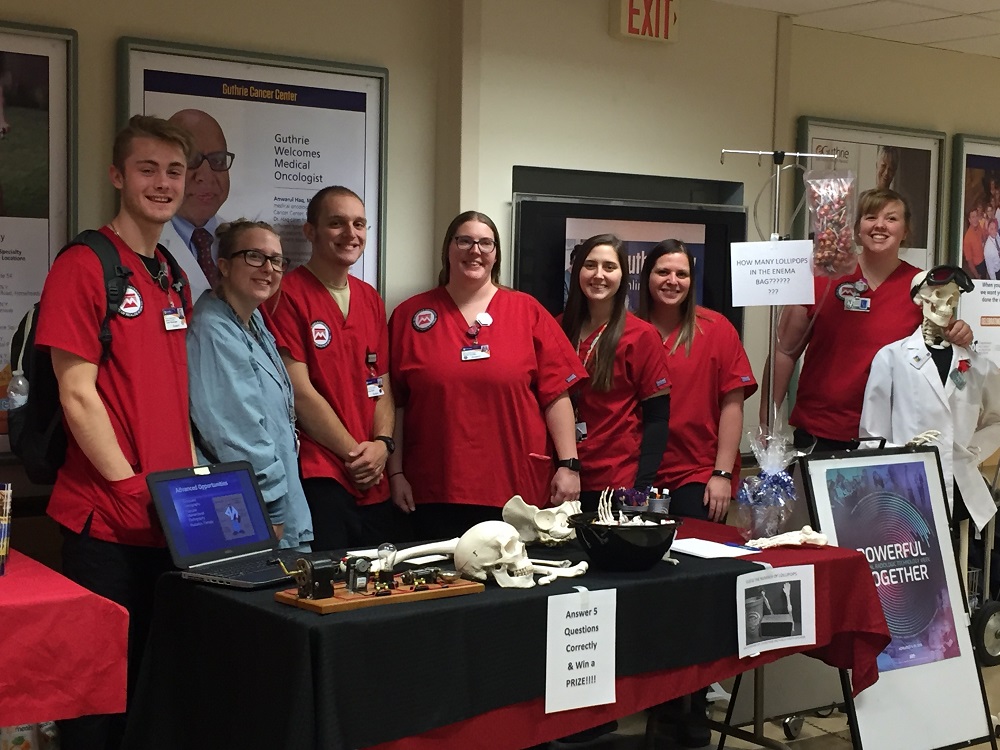Providing High-Quality Patient Care
As a graduate of our program, you will possess the knowledge and experience necessary to work with state-of-the-art, fully digital Radiology equipment. Your extensive clinical education, working with physicians and other healthcare team members, will prepare you to positively impact the lives of your patients. If you are searching for a rewarding technology-based, patient-centered career in which you help to improve the health and well-being of your community, Radiologic technology may be the profession for you!
 Mansfield students celebrating National Radiologic Technologists Week at Guthrie Robert Packer Hospital.
Mansfield students celebrating National Radiologic Technologists Week at Guthrie Robert Packer Hospital.
Radiologic Technology at Mansfield
- A.A.S. in Radiologic Technology
- Careers in Radiologic Technology
- Mission Statement
- Goals and Student Learning Outcomes
- Additional Program Costs
Associate of Applied Science in Radiologic Technology
*Please see the CU degree requirements effective Fall 2023. All enrolled students can also review their degree program requirements and track progress to degree completion in Degree Works.
MA Degree Requirements (Effective Prior to Fall 2023)
For specific course and program requirements, please consult the current undergraduate catalog.
The Associate of Applied Science Program in Radiologic Technology is designed to develop competent, entry-level diagnostic radiographers. This two-year program is a collaborative program between the Commonwealth University Mansfield campus and Guthrie Robert Packer Hospital. Students spend their first semester on the Mansfield campus. The remaining three semesters and two summer sessions are spent at Guthrie Robert Packer Hospital gaining clinical experience.
Completion of the Radiologic Technology Program prepares students through extensive clinical experience at the Radiology Department of Guthrie Robert Packer Hospital in Sayre, Pennsylvania. Students are routinely assigned to diagnostic areas and gain familiarity with specialty areas through clinical rotations.
This program provides a high-quality academic curriculum in the classrooms at Commonwealth University Mansfield campus and a guided approach to clinical experience at Guthrie's Robert Packer Hospital.
*Please see the MA degree requirements for students who were enrolled prior to Fall 2023 and remained in the MA Program. All enrolled students can also review their degree program requirements and track progress to degree completion in Degree Works.
Visit also the Guthrie Radiologic Technology Program website and Guthrie's Program Catalog (pdf).
The Radiologic Technology program’s certification exam pass rate, program completion rate and job placement rate can be found via this link: Program Effectivness Data Calculation (pdf), as well as on the Joint Review Committee on Education in Radiologic Technology’s website via this link at https://www.jrcert.org/programs/mansfield-university/
The Commonwealth University Mansfield campus Radiologic Technology program is accredited by the Joint Review Committee on Education in Radiologic Technology (JRCERT). The Mansfield University program was most recently accredited in 2015 for a period of 8 years. The program received continuing accreditation in 2019 after submitting its Interim Report to the JRCERT. The next program accreditation review by the JRCERT will take place in 2023.
Joint Review Committee on Education in Radiologic Technology
20 N. Wacker Drive, Suite 2850
Chicago, IL 60606-3182
https://www.jrcert.org/
Email: mail@jrcert.org
Phone: (312) 704-5300
Fax: (312) 704-5304
Careers
Many Radiologic Technology graduates go on to pursue employment in specialty areas such as:
- CT
- Imaging Informatics
- Mammography
- MRI
- Radiation Therapy
- Ultrasound
- Vascular Interventional Radiology
For a listing of available jobs and internships in your field, visit the Career Center at Mansfield University!
Mission Statement
The mission of the Radiologic Technology program is to integrate Commonwealth University's liberal arts emphasis to develop competent entry level diagnostic radiographers. As graduates, these radiographers will possess the expertise necessary to meet the needs of the communities they serve, while providing compassionate, patient-centered care.
Goals and Student Learning Outcomes
Goal #1: To provide the health care community with competent, entry-level diagnostic radiographers.
1. Students will position patients accurately.
2. Students will align the CR accurately.
3. Students will select optimal exposure factors.
4. Students will apply radiation protection principles.
5. Students will successfully perform diagnostic procedures while under the supervision of staff technologists.
Goal #2: Students will demonstrate appropriate patient communication and education skills.
1. Students will identify themselves and the patient, verify the body part to be imaged, and obtain an accurate history.
2. Students will explain the procedure and process for obtaining the diagnostic report.
Goal #3: Students will demonstrate problem-solving and critical thinking when performing medical procedures.
1. Students will demonstrate critical thinking while performing radiographic procedures.
2. Students will evaluate radiographic images for appropriate positioning and image quality.
Goal #4: Students will demonstrate professionalism.
1. Students will demonstrate professional and ethical conduct.
2. Students will demonstrate professionalism through appropriate attendance and punctuality.
Goal #5: The program will continuously monitor its effectiveness.
1. Students will complete the program.
2. Graduates will pass the ARRT Certification Exam on the first attempt.
3. Graduates pursuing employment will be employed within twelve months after program completion.
Goal #6: The program will promote graduate and employer satisfaction.
1. Graduates will express satisfaction with the training received during the program.
2. Employers will express satisfaction with the performance of the graduate
Connect with the Radiologic Technology Program
|
Department Chair: |
Program Director: |
Sayre Administrative Assistant: |
Learn more about Mansfield University's Radiologic Technology Program.
Call 800-577-6826 or request information using the button below. Mansfield University AdmissionsLicensure and Certification Information
While some of Mansfield University's professional degree programs are designed to prepare students to meet Pennsylvania's licensure or certification requirements, these programs are not necessarily compatible with licensure or certification requirements in other states. Students who plan to enroll in Mansfield's degree programs with the intent to pursue licensure or certification in states other than Pennsylvania must be aware of the professional licensure requirements in those states. Current students who are planning to undertake field experiences outside of Pennsylvania should also be aware the requirements of other states. Consistent with federal regulations, Mansfield is making a good faith effort to determine if our academic programs leading to licensure or certification meet the requirements of licensing boards in other states. Doing so requires contacting out-of-state licensing boards and having those boards review Mansfield's program curricula. As information from the out-of-state licensure boards is received, it will be posted on the University Licensure and Certification page.





